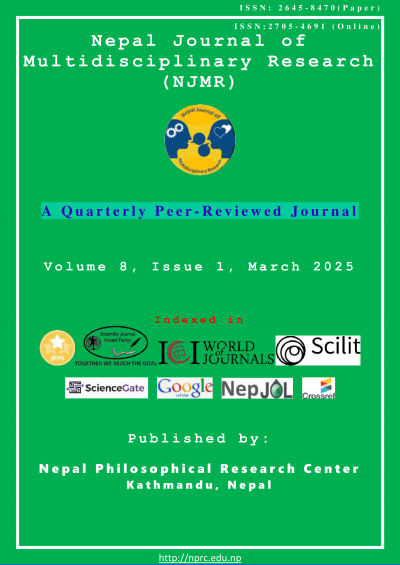Of Utopia and Heterotopia: The Question of Place in Mohsin Hamid’s The Reluctant Fundamentalist
DOI:
https://doi.org/10.3126/njmr.v8i1.74952Keywords:
topophilia, spatial reading, city of birth, harm America, utopia and heterotopiaAbstract
Background: Given the disciplinary background, it is unsurprising to state that the fictional portrayals incorporate real or invented settings for the characters in order to characterize a theme at hand. It can be argued that all or any reading of literature encompasses spatial dimension in the form of setting. And, literary places can have the shaping influences on the characters in texts. Although seemingly irrational, characters’ attachments to places invite us to rethink about the tyranny and/or privilege of places.
Methods: Informed by Foucauldian notion of utopias, heterotopias, and geo-criticism, this study analyzes the discursive spaces that create the dichotomies of places. Alongside, the analysis of the cases of the primary texts has yielded the analytic need of the research article. The method of within-case analysis has offered the twofold analytical framework: America and Anarkali as problems and privileges and the desire to harm America as it is considered the source of conflicts and standoffs.
Results: A character projects varied faces of America after he is educated there and comes back to the place of his birth. Although in abstract manner, the character demonstrates topophilia without adequate reasoning while loathes America for its vices and loves it for its virtues. Primarily, the study of places has offered an interpretation that a character from Pakistan in Mohsin Hamid’s The Reluctant Fundamentalist characterizes America in case by case approaches whilst his birthplace is admired almost unconditionally.
Conclusion: Places have associations and those associations offer meanings. Changez in Mohsin Hamid vehemently discusses brighter and darker sides of his American experiences. Not surprisingly, he analyzes his experiences from the perspective of vice and virtue. Contrarily, his birthplace Anarkali and its tea are not comparable to the experience of Princetonian education because they are far more superior. This inference leads to the reconfirmation of the old adage: Birthplace is dear to us despite its severe limitations.
Novelty: This study ushers in the renewed emphasis on the association between places and thematic concerns. More particularly, this study contributes to the existing body of narratives by pushing the boundaries of interpretation through the sustained consideration of places and people in literary accounts.
Downloads
Downloads
Published
How to Cite
Issue
Section
License
Copyright (c) 2025 The Author(s)

This work is licensed under a Creative Commons Attribution-NonCommercial 4.0 International License.
This license enables reusers to distribute, remix, adapt, and build upon the material in any medium or format for noncommercial purposes only, and only so long as attribution is given to the creator.




